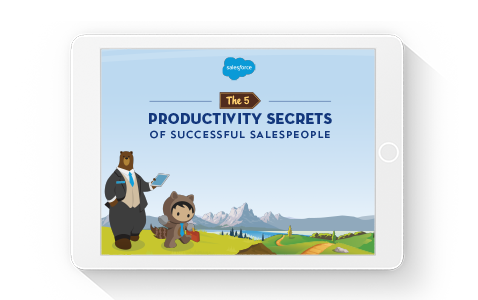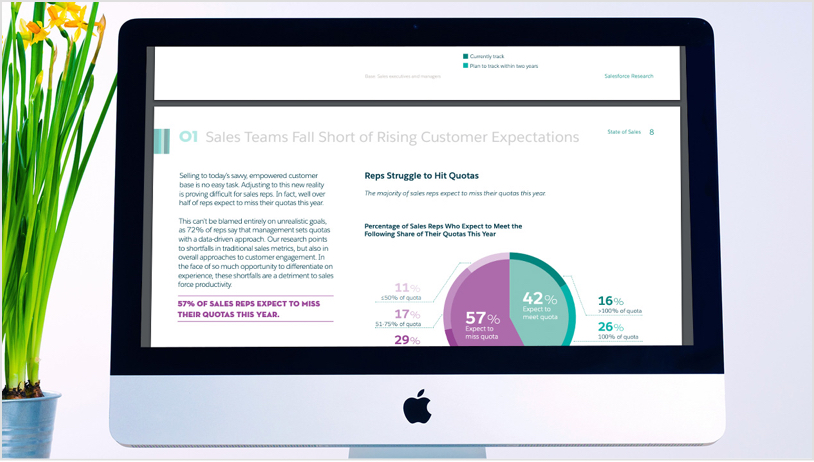Do You Really Need Sales Automation?
The best salespeople understand their audience’s needs and have a knack for delivering just the right message to prompt a purchase.
Behind the scenes, though, these same sales reps rely on tools that remove the busy work to get them a meeting in the first place. This technology includes:
Email scheduling: Software helps you strategically send emails when prospects are most likely to open them
Autodialing apps: Tools that enable you to instantly jump from one call to the next to minimize downtime
Time-based follow-ups: Automated reminders ensure no contacts are left untouched for prolonged periods of time
In the past, a common concern among salespeople was that technology, especially artificial intelligence, would replace them or make their jobs obsolete. Instead, the industry evolved in a way that made it easier for sophisticated sellers to build and scale their book of business faster.

Indeed, sales automation is now a business standard. Research shows a projected two-year growth of 86% for sales process automation.
In this article, we define sales automation, then explore how it benefits businesses and sales teams. It’s worth understanding how AI sales automation and software plays a role in many companies now — and will continue to in the future. After all, artificial intelligence takes sales force automation to the next level by empowering sales professionals to build more trust and credibility with customers.
What is sales automation?
In the process of generating leads, qualifying them, nurturing prospects, and converting the most promising contacts to sales, there are a number of small and labor-intensive actions that are an important and necessary part of the sales process.
Sales automation software isolates those repetitive actions and automates them using technology to save you energy and time. Examples include:
Weekly reporting: Creates an accurate and consistent reporting cadence
Meeting scheduling: An otherwise manual process that could save reps dozens of hours each year
Proposal reminders: Gently help you push a sale through to the finish line
When this software has built-in AI, it can “automate activity logging, identify high-priority emails, and create new contacts for you.” Sales automation software is the tool, and artificial intelligence is the assistant that makes the tool work smarter.
Organizations use sales automation to improve the efficiency and effectiveness of their sales force. Sales automation tools minimize the need for sales reps to manually complete tasks such as data entry, allowing them to spend more time on higher value-added activities, such as building better sales decks, researching the competition, and negotiating upsells with customers.

Explore 11 benefits of sales automation tools.
Sales automation software offers users a number of advantages. These include:
Advanced deal management. Keep an eye on the leads that have the most potential with less effort. Artificial intelligence in your sales automation tool alerts you to potential clients with the greatest chance of closing based on your company’s unique parameters.
Faster lead scoring and prioritization. Qualify a lead automatically based on their buyer journey. Sales automation tools track the interactions prospects have with your website, social media channels, and sales reps, and they help businesses prioritize the highest-potential customers.
Smarter lead assignment distribution. AI sales software can determine the industry or territory customers belong to, making it easier to assign a prospect to the right rep.
Automated lead nurturing. Send triggered messages that add value to the customer conversation at strategic points of their decision-making process.
Accelerated response times. Surface important documents and the sales collateral your customers want and send it to them immediately. This way they don’t have to wait for you to gather it from your colleagues.
Data-backed sales forecasting. Predicting sales and understanding seasonal trends has always been part of the process. Those figures were often based on hunches, complicated spreadsheets, or manual examinations of sales data. Now, however, sales software with AI takes your sales data and creates forecasts that are an “accurate measurement and lever of growth for your business.”
Consolidated and regular reporting. When reps use the same sales platform, the platform gathers all the information about prospects and customers in a unified dashboard, which makes it easier to pull real-time reports and make data-driven sales decisions.
Smoother collaboration and communication. Do better than shared documentation; work on files simultaneously to eliminate the down time that results from passing a file back and forth. Monitor changes, automatically notify others of updates, and request approvals with sales automation software that invites your sales team to work together.
Regular reminders for tasks. In sales, you can’t automate everything. For the manual tasks that require sales rep intervention, sales software prompts reps with reminders to complete upcoming and outstanding items so their clients’ needs remain top of mind.
Seamless scheduling. A sales automation tool helps make sure your reps never miss another appointment. It automatically fills up your calendar to minimize latency and downtime
Create faster proposals. Most CPQ software is designed to help you use smart templates to produce proposals and accurate quotes using the latest pricing parameters — even if those change on a daily basis.
Automation leads to six key outcomes.
When organizations employ sales automation, six key outcomes are:
Boost in productivity. When you automate labor-intensive but low value-add activities like lead scoring, scheduling, reporting, and reminders, teams end up saving hours each week. They can use that time to create more meaningful interactions with prospects.
Improvement in lead-to-sales ratios. Sales automation platforms keep sales reps accountable and prospects engaged, both of which increase your chances of closing the sale.
Shortened sales cycle. Deals flow easier with automation. Salespeople can lean on technology to provide leads with the appropriate sales collateral at just the right time to move them along their decision-making process.
Insightful data. Sales technology can help you audit individual rep performances, your team’s pipeline, and an individual channel’s success. Plus, when companies leverage artificial intelligence, their sales automation tools identify opportunities for faster growth and efficiency improvements and generate more accurate sales forecasts.
Fewer lost leads. When reps are responsible for reporting and supporting all of their leads, a few will likely fall through the cracks. To minimize human error, companies use sales automation technology to prompt teams when leads go unaddressed or unanswered for too long.
Reduced costs per sale. Enterprise sales teams generally save money with sales automation. Rather than assigning manual labor toward time-intensive and low-value tasks, businesses let technology take care of them in the background.

Sales automation software isn't a passing trend.
As B2B sales becomes more complex, solutions like sales automation software make selling more manageable. At the moment, some business owners might suggest it’s merely a passing trend, but when technology improves employee productivity and performance, it has staying power.
Sales automation tools can help field reps get all the information they need to close an account when they use the available mobile apps. For inside sales, teams can use desktop solutions to win over new customers. Many AI sales automation tools integrate with your existing CRM software, too.
Sales automation software doesn't replace sales reps. Instead, sales automation tools help your reps close more deals, faster. Learn more about how Sales Cloud can help reps spend more time selling.
Do You Really Need Sales Automation?
The best salespeople understand their audience’s needs and have a knack for delivering just the right message to prompt a purchase.
Behind the scenes, though, these same sales reps rely on tools that remove the busy work to get them a meeting in the first place. This technology includes:
Email scheduling: Software helps you strategically send emails when prospects are most likely to open them
Autodialing apps: Tools that enable you to instantly jump from one call to the next to minimize downtime
Time-based follow-ups: Automated reminders ensure no contacts are left untouched for prolonged periods of time
In the past, a common concern among salespeople was that technology, especially artificial intelligence, would replace them or make their jobs obsolete. Instead, the industry evolved in a way that made it easier for sophisticated sellers to build and scale their book of business faster.

Indeed, sales automation is now a business standard. Research shows a projected two-year growth of 86% for sales process automation.
In this article, we define sales automation, then explore how it benefits businesses and sales teams. It’s worth understanding how AI sales automation and software plays a role in many companies now — and will continue to in the future. After all, artificial intelligence takes sales force automation to the next level by empowering sales professionals to build more trust and credibility with customers.
What is sales automation?
In the process of generating leads, qualifying them, nurturing prospects, and converting the most promising contacts to sales, there are a number of small and labor-intensive actions that are an important and necessary part of the sales process.
Sales automation software isolates those repetitive actions and automates them using technology to save you energy and time. Examples include:
Weekly reporting: Creates an accurate and consistent reporting cadence
Meeting scheduling: An otherwise manual process that could save reps dozens of hours each year
Proposal reminders: Gently help you push a sale through to the finish line
When this software has built-in AI, it can “automate activity logging, identify high-priority emails, and create new contacts for you.” Sales automation software is the tool, and artificial intelligence is the assistant that makes the tool work smarter.
Organizations use sales automation to improve the efficiency and effectiveness of their sales force. Sales automation tools minimize the need for sales reps to manually complete tasks such as data entry, allowing them to spend more time on higher value-added activities, such as building better sales decks, researching the competition, and negotiating upsells with customers.

Explore 11 benefits of sales automation tools.
Sales automation software offers users a number of advantages. These include:
Advanced deal management. Keep an eye on the leads that have the most potential with less effort. Artificial intelligence in your sales automation tool alerts you to potential clients with the greatest chance of closing based on your company’s unique parameters.
Faster lead scoring and prioritization. Qualify a lead automatically based on their buyer journey. Sales automation tools track the interactions prospects have with your website, social media channels, and sales reps, and they help businesses prioritize the highest-potential customers.
Smarter lead assignment distribution. AI sales software can determine the industry or territory customers belong to, making it easier to assign a prospect to the right rep.
Automated lead nurturing. Send triggered messages that add value to the customer conversation at strategic points of their decision-making process.
Accelerated response times. Surface important documents and the sales collateral your customers want and send it to them immediately. This way they don’t have to wait for you to gather it from your colleagues.
Data-backed sales forecasting. Predicting sales and understanding seasonal trends has always been part of the process. Those figures were often based on hunches, complicated spreadsheets, or manual examinations of sales data. Now, however, sales software with AI takes your sales data and creates forecasts that are an “accurate measurement and lever of growth for your business.”
Consolidated and regular reporting. When reps use the same sales platform, the platform gathers all the information about prospects and customers in a unified dashboard, which makes it easier to pull real-time reports and make data-driven sales decisions.
Smoother collaboration and communication. Do better than shared documentation; work on files simultaneously to eliminate the down time that results from passing a file back and forth. Monitor changes, automatically notify others of updates, and request approvals with sales automation software that invites your sales team to work together.
Regular reminders for tasks. In sales, you can’t automate everything. For the manual tasks that require sales rep intervention, sales software prompts reps with reminders to complete upcoming and outstanding items so their clients’ needs remain top of mind.
Seamless scheduling. A sales automation tool helps make sure your reps never miss another appointment. It automatically fills up your calendar to minimize latency and downtime
Create faster proposals. Most CPQ software is designed to help you use smart templates to produce proposals and accurate quotes using the latest pricing parameters — even if those change on a daily basis.
Automation leads to six key outcomes.
When organizations employ sales automation, six key outcomes are:
Boost in productivity. When you automate labor-intensive but low value-add activities like lead scoring, scheduling, reporting, and reminders, teams end up saving hours each week. They can use that time to create more meaningful interactions with prospects.
Improvement in lead-to-sales ratios. Sales automation platforms keep sales reps accountable and prospects engaged, both of which increase your chances of closing the sale.
Shortened sales cycle. Deals flow easier with automation. Salespeople can lean on technology to provide leads with the appropriate sales collateral at just the right time to move them along their decision-making process.
Insightful data. Sales technology can help you audit individual rep performances, your team’s pipeline, and an individual channel’s success. Plus, when companies leverage artificial intelligence, their sales automation tools identify opportunities for faster growth and efficiency improvements and generate more accurate sales forecasts.
Fewer lost leads. When reps are responsible for reporting and supporting all of their leads, a few will likely fall through the cracks. To minimize human error, companies use sales automation technology to prompt teams when leads go unaddressed or unanswered for too long.
Reduced costs per sale. Enterprise sales teams generally save money with sales automation. Rather than assigning manual labor toward time-intensive and low-value tasks, businesses let technology take care of them in the background.

Sales automation software isn't a passing trend.
As B2B sales becomes more complex, solutions like sales automation software make selling more manageable. At the moment, some business owners might suggest it’s merely a passing trend, but when technology improves employee productivity and performance, it has staying power.
Sales automation tools can help field reps get all the information they need to close an account when they use the available mobile apps. For inside sales, teams can use desktop solutions to win over new customers. Many AI sales automation tools integrate with your existing CRM software, too.
Sales automation software doesn't replace sales reps. Instead, sales automation tools help your reps close more deals, faster. Learn more about how Sales Cloud can help reps spend more time selling.
Salesforce Resources

E-book
Sales Pitfalls: 8 Productivity Mistakes to Avoid.
About the Author
Senior Director of Content Marketing, Salesforce




